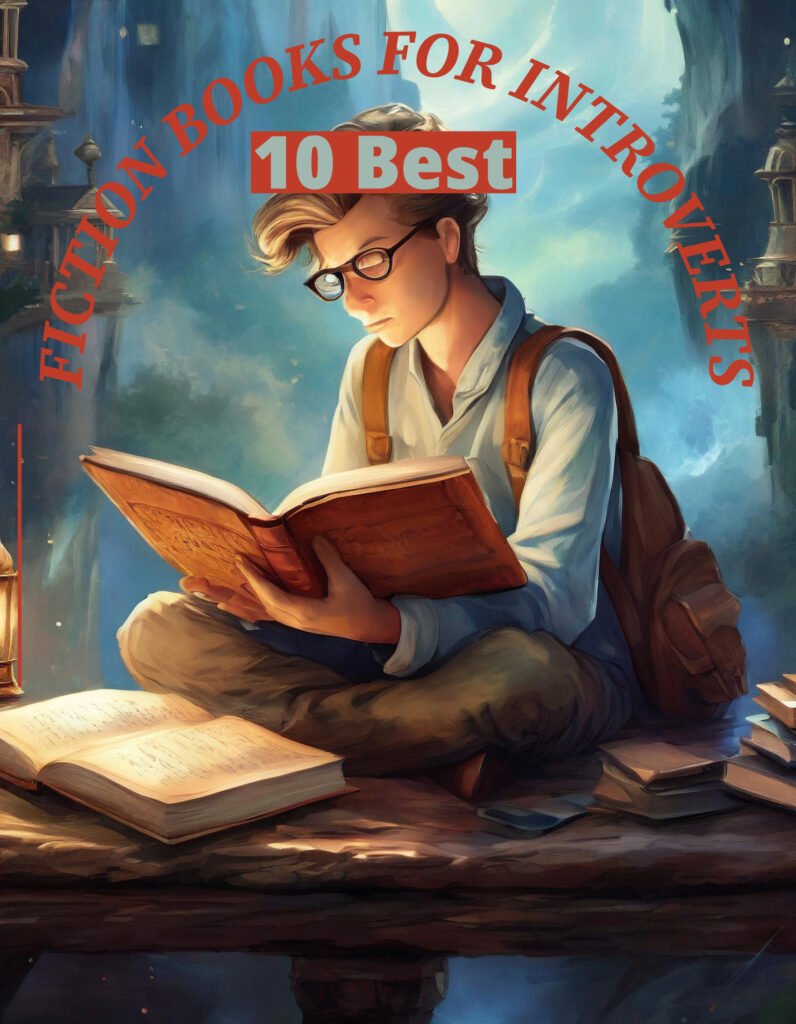Introduction
Introverts often see themselves in the books they read. This blog post highlights 10 books that speak to introverted readers. These books, featuring characters who thrive in solitude, offer unique narratives that explore the virtues of quiet introspection and personal growth. Each story transforms the quiet world of the introvert into a landscape rich with adventure and self-discovery. Dive in and discover how these tales can illuminate the introverted experience, providing both reflection and escape.
1. “The Perks of Being a Wallflower” by Stephen Chbosky

Stephen Chbosky’s “The Perks of Being a Wallflower” plunges us into Charlie’s tumultuous freshman year, capturing his unique perspective as he navigates high school from the shadows. More observer than participant, Charlie’s tender heart and keen eyes offer a fresh lens on the chaos of adolescence. Key experiences, such as a transformative Secret Santa exchange and deep conversations with his English teacher, mark significant milestones in his journey of self-discovery. Chbosky’s narrative celebrates the introspective and the sensitive, providing not just a reflection of introvert struggles but also subtle guidance on finding one’s place in a bustling world.
2. “Eleanor Oliphant Is Completely Fine” by Gail Honeyman

In “Eleanor Oliphant Is Completely Fine,” Gail Honeyman introduces us to Eleanor Oliphant, a woman whose life ticks with the precision of a metronome from her meticulously planned meals to her vodka-drenched weekends. Her life takes an unexpected turn when she and a quirky coworker rescue an elderly man, sparking the first crack in her carefully maintained emotional fortress. This event begins Eleanor’s slow transformation as she confronts her painful past and learns the power of vulnerability. Honeyman vividly shows how small acts of kindness can unravel a life bound by loneliness, transforming it into one of connection and healing. This novel isn’t just a journey into the heart of its introverted protagonist, it’s a gripping reminder of the liberating, yet terrifying power of opening up.
3. “The Night Circus” by Erin Morgenstern

Erin Morgenstern’s “The Night Circus” draws you into a shadowy world where enchantment intertwines with covert competition. Set within a mystical circus, the venue itself is a character each tent and shadow crafted to conceal enchantments and host a duel between two young illusionists, Celia and Marco. Their contest extends beyond mere magical prowess, it’s a mental and moral odyssey that compels them to reevaluate their deepest beliefs and desires. The novel particularly resonates with introverts as it mirrors their internal journey highlighting the power of solitude and reflective thought. “The Night Circus” is a deep dive into how our hidden dreams and fears can manifest, blending the fantastical with the profoundly real.
4. “The Ocean at the End of the Lane” by Neil Gaiman

Neil Gaiman’s “The Ocean at the End of the Lane” melds stark childhood realities with mystical elements, creating a narrative where vivid characters and ethereal mysteries collide. Returning to his childhood home, the protagonist slips into a realm where youthful myths intertwine with adult horrors, forcing him to confront the fears that have shadowed his adult life. The Hempstock family, embodying themes of protection and sacrifice, serves as both mystical guides and emotional anchors, highlighting the narrative’s deep human connections. This story resonates with introverts, illustrating the quiet courage required to face personal fears battles often fought in the solitude of one’s mind. Gaiman’s tale celebrates these unseen struggles, emphasizing that the real magic stems from our internal victories over darkness.
5. “The Catcher in the Rye” by J.D. Salinger

J.D. Salinger’s “The Catcher in the Rye” showcases the timeless voice of Holden Caulfield, the quintessential teen rebel and king of side-eye, who slices through the B.S. of the adult world with razor-sharp cynicism. From critiquing superficiality to facing genuine suffering, Holden’s journey is marked by a standout moment with nuns at a train station. Their unassuming sincerity cuts through the pretense he despises, pushing him toward a clumsy but sincere search for authenticity. This novel resonates with introverts who perceive the social veneer with acute clarity and face the weight of that insight daily. Holden isn’t just a character, he’s the late-night voice questioning everything, making him a raw, relatable figure for those who navigate life from the edges.
6. “Quiet: The Power of Introverts in a World That Can’t Stop Talking” by Susan Cain

Susan Cain’s “Quiet: The Power of Introverts in a World That Can’t Stop Talking” has ignited a crucial conversation, redefining success in our extrovert-centric society. Cain uses compelling evidence, including case studies of a high-powered attorney who employs reflective negotiation techniques and a record-breaking salesman who leverages empathy over aggression. These narratives showcase how introverts excel in environments traditionally dominated by extroverts. Cain equips introverts with insights and strategies, transforming perceived weaknesses into strengths. “Quiet” is essential reading for anyone who feels overlooked in a noisy world, offering not just solace but also practical methods to harness their quiet capabilities effectively.
7. “A Man Called Ove” by Fredrik Backman

Fredrik Backman’s “A Man Called Ove” introduces us to Ove, a no-nonsense old man whose daily routines are as rigid as his opinions. His life, marked by grief and a grumpy demeanor, unexpectedly changes when new neighbors disrupt his planned solitude. Ove’s darkly humorous failed suicide attempts draw him into the lively and chaotic world of those around him, revealing his tough exterior layer by layer. Backman skillfully blends humor with Ove’s underlying heartache, exposing his painful past and inherent decency through surprising interactions that warm both Ove and the reader. The story subtly explores the significance of community, showing how Ove’s reluctant connections with others underscore the quiet, impactful heroism found in everyday life, emphasizing the profound influence of seemingly small actions.
8. “Norwegian Wood” by Haruki Murakami

Set against the backdrop of the turbulent 1960s in Tokyo, amidst societal change and student protests, Haruki Murakami’s “Norwegian Wood” mirrors the external chaos in the quiet, internal battles of its protagonist, Toru Watanabe. Toru’s journey through love and loss is intricately woven through his relationships with Naoko, a haunting figure of his past, and Midori, a beacon for his future, each pulling him between the poles of mourning and moving forward. Murakami’s calm prose cuts through the complexities of emotion, revealing the stark contours of loneliness and connection that define Toru’s youth. The novel probes the deep shadows that past traumas cast over our present, showing how our ghosts shape our futures. Through Toru’s introspective quest, Murakami captures the essence of our struggles for meaning amid grief and our attempts to forge an identity in a relentless world. This narrative not only recounts a personal journey but also evokes the existential dilemmas that resonate deeply with us all.
9. “The Secret History” by Donna Tartt

Donna Tartt’s “The Secret History” plunges the reader into the seductive and perilous world of elite academia, where a tight-knit group of classical studies students spiral from scholarly pursuits into a chilling moral abyss. As their academic obsessions turn to real-world rituals, their quest for higher truth devolves into murder and betrayal. Tartt entangles beauty with horror, drawing the reader deeper into the intoxicating but deadly consequences of living too fervently in the realm of ideas. For introverts, the novel resonates as a meditation on the seductive power of thought and the dangers of intellectual isolation. It serves as both a tribute to the life of the mind and a stark warning about the dark paths such pursuits can lead to, challenging readers to ponder the deep costs of unchecked ambition.
10. “Kafka on the Shore” by Haruki Murakami

In “Kafka on the Shore,” Haruki Murakami masterfully intertwines the odysseys of a runaway teenager and an enigmatic elder with a connection to the otherworldly. This novel unfolds as a surreal journey through destiny and consciousness, exploring deep philosophical questions within the intricate tapestry of the human soul. Murakami crafts a mesmerizing narrative where myth and music seamlessly merge with metaphysics, drawing the reader deeper into its enigmatic world. The story resonates particularly with those who question the boundaries between the seen and unseen, beckoning them to embark on a profound journey into the mysteries of their own destinies and the enigmas of existence.
Conclusion
These books open doors to realms where silence resonates with meaning and unspoken truths are palpably clear. They affirm that stillness can reveal profound depths, unveiling beauty and insight in moments of quiet. Each narrative offers a sanctuary for the introspective soul, mirroring our sensitivities and longing for deeper connections. Turning these pages, you embark on a journey that celebrates the resilience of the quiet spirit, the boundless power of imagination, and the subtle impacts we leave on the world. Happy reading.






